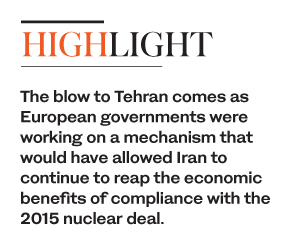JEDDAH: Accusations in France that Iran was behind a foiled bomb plot near Paris on June 30 seem to have put paid to any hopes President Hassan Rouhani had to use Europe to beat crippling US sanctions.
The blow to Tehran comes as European governments were working on a mechanism that would have allowed Iran to continue to reap the economic benefits of compliance with a landmark 2015 nuclear deal with the US and a number of European nations, which was jettisoned by American President Donald Trump in May.
“Such allegations, whether true or not, at this moment in time will serve only to harm both Rouhani’s government and the Iranian nation,” Saeed Leylaz, a lecturer at Tehran’s Shahid Beheshti University, told Agence France Presse.
“I am certain this (allegation) is a source of worry for the government, because it happened while the Islamic Republic needs every single relationship and link with the West, minus the United States,” said Leylaz.
Oubai Shahbandar, a Syrian-American analyst and fellow at the New America Foundation’s International Security Program, said that while the threat of Daesh terrorism has haunted Europe for the past few years, “the very real threat of what very much looks to be a modern-day Iranian-directed terror network will prove to be discomfiting for European Union leaders and for the future security of the European continent.”
He said the capture of Iranian diplomats implicated in the failed terror attack in Paris, along with the freezing of the assets of pro-Hezbollah Zahra Center in France, might be only the tip of the iceberg.
“Iran may have made a major miscalculation in allegedly ordering these attacks on European soil. You can certainly expect a major backlash at a time when Tehran can least afford it, given Iran’s attempts to gain European support to counter the re-imposition of crippling sanctions by the Trump administration,” added Shahbandar.
Separately, White House National Security Adviser John Bolton said the US faced threats from Iran, which he called “the world’s central banker of international terrorism since 1979.”
He said: “Radical Islamist terrorist groups represent the pre-eminent transnational terrorist threat to the United States and to the United States’ interests abroad.”
 Rouhani, who was re-elected to a second four-year term last year on the promise of greater economic dividends from his government’s opening to Washington, was already reeling from the economic fallout of Trump’s abandonment of the nuclear deal.
Rouhani, who was re-elected to a second four-year term last year on the promise of greater economic dividends from his government’s opening to Washington, was already reeling from the economic fallout of Trump’s abandonment of the nuclear deal.
A precipitous slide in the value of the rial against the dollar hit the purchasing power of ordinary Iranians, while an anticipated boost to Western investment failed to materialize, hitting plans to renew Iran’s antiquated infrastructure.
Rouhani had counted on EU governments to work with the other parties to the deal — China and Russia — to mitigate the impact of the US policy U-turn but the French allegation has now put those hopes in jeopardy.
The allegations were swiftly seized on by the Trump administration as vindication of its hard line.
“France taking strong action against failed Iranian terrorist plot in Paris — Tehran needs to know this outrageous behavior will not be tolerated,” the White House’s National Security Council tweeted.
Rouhani’s government sees the hand of the Trump administration behind the allegations, convinced Washington is determined to undermine European resistance to the US abandonment of the JCPOA, the official acronym for the nuclear deal.
“Some centers of power do not approve of Iran’s good relations with Europe — that it is staying in the JCPOA and that its economic ties with the EU continue,” Ghasemi said.



























